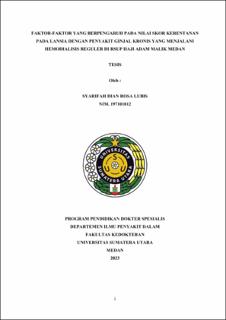Faktor-Faktor yang Berpengaruh pada Nilai Skor Kerentanan pada Lansia dengan Penyakit Ginjal Kronis yang Menjalani Hemodialisis Reguler di RSUP Haji Adam Malik Medan
Factors That Influence The Frailty Scores in Elderly with Chronic Kidney Disease who Undergo Regular Haemodialysis at Haji Adam Malik Hospital Medan

Date
2023Author
Lubis, Syarifah Dian Rosa
Advisor(s)
Ariestine, Dina Aprillia
Purba, Ariantho Sidasuha
Ramadani, Sumi
Metadata
Show full item recordAbstract
Background: The prevalence of kerentanan in the elderly population is reported to be greater than
60% in haemodialysis-dependent PGK patients. Several factors can also influence kerentanan score
according to the Comprehensive Geriatric Assessment (CGA). Important elements of the CGA
include Mini Nutritional Assessment (MNA), Charlson Comorbidity Index (CCI), Barthel Index of
Activities of Daily Living (ADL), Mini Mental State Examination (MMSE), Geriatric Depression
Scale (GDS) and social conditions including age and gender. Identification of risk factors is essential
to improve and enhance the quality of care for PGK patients with kerentanan.
Aim: To determine the factors that influence kerentanan score in elderly people with penyakit ginjal
kronis undergoing regular haemodialysis at RSUP Haji Adam Malik Medan.
Method: This is a cross sectional study. The research subjects were all elderly people with PGK
and undergoing routine haemodialysis at RSUP Haji Adam Malik Hospital Medan who were
fulfilled both inclusion and exclusion criteria within the study period. The bivariate analysis used
was the spearman test for all variables except gender, which used independent sample T-test and
mental status used pearson correlation test. Multivariate analysis of all factor simultaneously using
the linear regression analysis test towards kerentanan.
Results: From 62 samples, there was a correlation of age with kerentanan score (p value = 0.019
and R = 0.298); nutritional factors with kerentanan score (p value <0.001 and R -0.666);
comorbidities with kerentanan score (p<0.001 and R 0.556); functional status with kerentanan score
(p<0.001 and R -0.875); mental status with kerentanan score (p<0.001 and R -0.711); depression
with kerentanan score (p<0.001 and R 0.557) and there was no correlation of gender with kerentanan
score (p value = 0.962). Multivariate analysis all factors toward kerentanan showed there were
significant p value Multivariate analysis of all factors on kerentanan score showed significant p
values only found in CCI, MMSE and ADL respectively 0.006; 0.004; 0.000 with R2 value of
80.1%.
Conclusion: Increasing age may increase kerentanan scores with a weak correlation magnitude.
There was no significant correlation between gender and kerentanan score. The better a person's
nutritional status, the lower the kerentanan score with a strong correlation magnitude. The more
severe the comorbidities, the more kerentanan score will increase with a moderate correlation
magnitude. The better the geriatric functional status, the lower the kerentanan score would be with
a very strong correlation magnitude. The better the geriatric mental status, the lower the kerentanan
score with a strong correlation magnitude. Depression status suffered by geriatrics can increase
kerentanan scores with moderate correlation magnitude. Multivariate analysis showed that CCI,
MMSE and ADL were the variables which most influenced kerentanan simultaneously.
Collections
- Master Theses [417]
